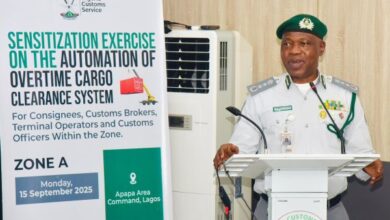Uber, Bolt, others May Pay N10m License Fee, 10% of Each Trip To Lagos Govt to Stay In Business

Lagos State Government is proposing a new regulation for ride-hailing companies operating in the state – a regulation that may hobble operations of car-hailing companies.
The new regulations follow the crackdown on drivers of ride-hailing compainies by the state government in the last couple of weeks.The crackdown which resulted in the impounding of vehicles belonging to several Uber drivers was reportedly because the drivers didn’t have hackney permits and Lagos State Drivers’ Institute (LASDRI) certification.
Under the new regulations, which come into effect on March 1, drivers on ride-hailing platforms are required to have LASDRI card and a driver badge issued by the Department of Public Transport and Commuter Services of the Ministry of Transport.
The vehicles on such platforms must have hackney permits, which cost as much as N15,000 and will be issued by the Lagos State Motor Vehicle Administration Agency and be fitted with a tag to be issued by the aforementioned department.
While negotiations are ongoing between the state and ride-hailing operators, the new regulations will mandate third-party operators like Uber and Bolt to pay N10 million naira and an annual renewal fee of N5 million if they have less than 1000 drivers.
Third-party operators that have more than 1000 drivers will pay N25 million licensing fee and N10 million annual renewal fee. Operators who directly own their cars and employ their drivers will pay only the license fee of N5 million if such operators have below 50 drivers. Those who have more than 50 drivers will pay N10 million for the operating license.
Under the new regulation, the state government will earn 10% the fare of each trip. This means that for a trip of N5000 the government will receive N500.
This 10% tax on each trip could be the government’s method of taking a share of the booming ride-hailing business in the state. It is expected that this, somehow, will come at the expense of the drivers as ride-hailing companies like Uber already have between 20-30% the cost per trip.
The president of National Union of Professional E-Hailing Driver-Partners, (NUPeDP), Ayoade Ibrahim said that he was aware that the government had a meeting with 20 operators, where they were told about the amount to be paid for the license and renewal fees.He however, expressed confidence that the government’s 10% won’t be the drivers’ burden to bear. The chairman expressed regret that car-hailing companies have failed to recognise the union and as such, can’t work hand in hand with them.
“App (taxi-hailing) companies believe they don’t need to recognize driver partners and the National Union of Professional e-hailing Driver partners An Affiliate of Trade Union Congress Of Nigeria,” Ayoade said.
“If they recognise the union by now we would have fought for them. They cannot lower driver partners incomes because app companies believe they don’t need us.”
He said the drivers have also started negotiating with the government to amend the regulations, which he said did not factor in their peculiar operating conditions.
“All of these laws and licence are not for us and that is what we are trying to let them know,” he said.
Ayoade also confirmed to TechNext that his union is having its separate negotiation with the government. This is understandable since Uber and Taxify have never treated their drivers as part of them, insisting that they are merely contractors. As such, the drivers have always operated independently.
The chairman explained that drivers don’t have many of the documents required by the government. As such, they want a regulation that would be fair on them.
“We’re negotiating with government and we will prove to them why we cannot have those documents. This is gig economy and we are gig workers. What we need is fair regulations that is commiserate with our incomes. We have forwarded our ideas to government on what they are supposed to do.”
But the spokesperson of the Ministry of Transport Bolanle Ogunlana said the state has not asked any operator to pay license or renewal fees.
She, however, said the ministry was in discussions with relevant stakeholders to come up with operational guidelines.
“Discussions with the Lagos State Ministry of Transport are still ongoing and we would continue to work with relevant stakeholders to build a strong ride-hailing with your welfare at heart,” Bolt said in a message to its drivers and riders.
While reports claim the government discussed the licensing fee with about 20 operators, the spokesperson of the Ministry of Transport, Bolanle Ogunlana said the state has not yet instructed any operator to pay license fees.
She, however, confirmed that the government and operators were negotiating on the operational guidelines for ride-hailing and Transportation in the state.
In the weeks that followed, officials of the Vehicle Inspection Services clamped down on Uber and Bolt drivers, demanding hackney permits and Lagos State Drivers’ Institute license.
Officials of the VIS said those regulations were not new and that the ride-hailing companies were aware of their existent. But a few of the drivers, who spoke to The Guardian, said they were not aware that they needed to have such documents.
“My car was impounded and I was asked to pay N60,000 into the government’s account before it could be released to me,” said Moses Ndubuisi.
The commissioner of transport in the state Frederic Oladeinde said on February 17 that the action was not deliberately targeted at Uber and Bolt drivers. He said over 1000 vehicles were impounded by the VIS and only 20 were used for ride-hailing.
“The Vehicle Inspection Service (VIS) is performing its statutory duty of facilitating compliance with the Road Traffic Laws by ensuring motorists possess the stipulated vehicle documents, such as Roadworthiness, Vehicle Licence, Drivers Licence, Insurance Certificate, Hackney Permit and the Lagos State Drivers Institute (LASDRI) card for all categories of commercial commuter vehicles,” Oladeinde said in an emailed statement.
Bolt said in the message sent to its drivers that it was engaging with Lagos State Government to ensure “that any new regulations are implemented efficiently.”
Although Uber’s Aiyevbomwan declined further comments, a driver on Uber platform Sunday Faleye said the ride-hailing giant sent a message to its drivers on Wednesday to update their profile with copies of their hackney permits and LASDRI licenses. Uber also listed “valid Hackney permit” as one of the criteria for enrolling vehicles on its platform.
Ibrahim said he hoped the government would suspend the implementation of the new regulations until the conclusion of negotiations among all the parties concerned.
Yetunde Adegoke











